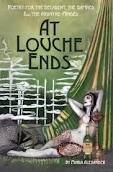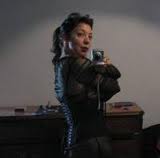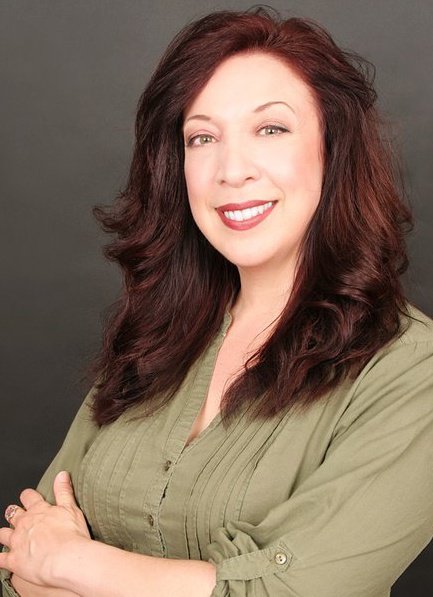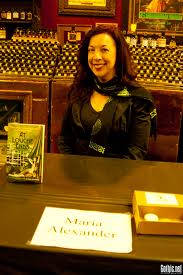Brad C. Hodson
A writer who still thinks the word "blog" sounds like something dirty.
Women In Horror Month: An Interview With Maria Alexander
Posted on February 10, 2012 by Brad C. Hodson
Horror writers often break molds. The stereotype for many is a thin, scarecrow-esque middle aged man in a Black Flag t-shirt with a blazer thrown over it, probably bullied frequently as a kid, with a twisted streak that gets exorcised in his writing lest he do something equally as horrid in the real world. Fortunately, these folks are actually few and far between. Instead the genre is filled with the truly unexpected. Wrath James White, for instance, who is a former professional MMA fighter, or Jonathan Maberry who has trained SWAT units.
And then there’s Maria. Writer. Samurai. Disney Copywriter. Maria Alexander describes herself as a “former fundamentalist turned fatalist.” While it’s tempting at first glance to shrug her off as “just another Goth chick,” a conversation with Maria will beat that notion out of you with a foot long piece of rattan.
Maria’s fiction has appeared everywhere, including LOST ON THE DARKSIDE and UNSPEAKABLE HORROR. Her non-fiction has been highlighted in THE WOMEN ACTION NETWORK and THE ANTHOLOGY AT THE END OF THE UNIVERSE: LEADING SCIENCE FICTION AUTHORS ON DOUGLAS ADAMS’ THE HITCHHIKER’S GUIDE TO THE GALAXY. She’s frequented BBC World Radio’s “Have Your Say” and can currently be found in the anthologies NIGHT TERRORS II (alongside moi – shameless plug) and MUTATION NATION, as well as her poetry collection AT LOUCHE ENDS or her Samantha Blaze detective yarn UNHOLYWOOD.

Enough of my blather. On to the interview.
Let’s start with a pretentious question that the tweed jacket stick-up-their ass types would ask: Why horror?
Because of my parents, I grew up in holy terror of the Anti-Christ, the Tribulation and the Mark of the Beast. Thanks to Hal Lindsey’s The Late, Great Planet Earth, my mother loved to rant about how the world was going to end—but not before the Anti-Christ came first and laid waste to civilization. I envisioned the Anti-Christ looking like a very angry Ricardo Montalban, running around with a giant barcode stamp to “mark” our foreheads. If we refused The Mark (and my mother stated loudly and clearly that she expected us to), we were going to get our heads cut off. Neat, huh? Sometimes she talked about Jesus coming back—you know, the happy bit?—but mostly she had this ghastly fascination with the Book of Revelation, the destruction of pretty much everything, and all things supernatural. My pint-sized brain soaked up all that stuff and processed it in some healthy ways, some not so healthy. I don’t know what would have come of me if I hadn’t become a writer or artist and had a productive way to play with all that doom and gloom.
While you write in virtually every medium, when I think of you I think of poetry. What draws you the most to poetry and how does horror poetry differ from other genres?
Really? Maybe because I blather about poetry so much. J Or maybe because of the name of my website, “Tales from the Handless Poet.” I’ve certainly written and published far more fiction than poetry.
I only write poetry when I’m either miserable or deeply in love. Or both. Or hella mad. Sometimes it’s healthier to hit people with words than sticks, ya know? (Although, I really enjoy almost hitting people with sticks in shinkendo. Does that count?) For some reason, I hate thinking of poetry in terms of genre, although I’d say so-called “horror” poetry is some of the worst poetry I’ve ever read. Well, maybe it’s not as bad as this…or maybe it is. Yes. Yes, some of it is.
Horror also has some sublime poetry, like Ann Schwader’s Lovecraftian verse. She makes you forget that Lovecraft’s prose was so turgid. She’s that good! And Wendy Rathbone, who I hope starts writing again. She’s a fabulous poet. All I know is that, when I joined the Science Fiction Poetry Association, I started getting their publication, Star*Line, which has megatons of brilliant poetry in every issue. I do think “horror” poetry has a ways to go before it’s overall as robust as “science fiction” poetry.
What poets have had the most impact on your work?
Eek.
Um. I have no idea. Baudelaire? Verlaine? The crazy rambling dude on the street corner near my condo? I read work here and there in every venue that influences me. Everything from poetry read by Garrison Keillor to random verse I find on Slate. And Tennyson, but I don’t think I write anything like him.
 AT LOUCHE ENDS: POETRY FOR THE DECADENT, THE DAMNED & THE ABSINTHE- MINDED was recently released by Burning Effigy and has been wracking up praise (and a few awards nods). Poetry collections seem fewer and farther between these days. Do you feel poetry is going through a slump? Or is it poised for a Renaissance?
AT LOUCHE ENDS: POETRY FOR THE DECADENT, THE DAMNED & THE ABSINTHE- MINDED was recently released by Burning Effigy and has been wracking up praise (and a few awards nods). Poetry collections seem fewer and farther between these days. Do you feel poetry is going through a slump? Or is it poised for a Renaissance?
Actually, there are really way too many poetry collections. Dear god. Everyone not only thinks they can write poetry, but they proceed to do so and then self-publish their unreadable drivel. Or give it away to no-name websites. People wonder why they don’t like poetry! So, no Renaissance. More like an extended Tribulation. I’m super hard on myself about what I write and always think twice, even thrice before I even begin to wonder if maybe what I’ve written is possibly a poem. And even then! I studied poetry in college with a phenomenal poet named Dr. Katherine Hohlwein, who was a student of Robert Frost. Upon having listened to her read from her own collections, I had decided there was simply no point in even trying. I then packed up my verse and let it gather dust for at least a decade. I found it many years later in my fiction writing. People have written to me and said that my fiction is poetry. Only then did I start to feel a smidge emboldened, like maybe I knew something after all. And that prose poetry of sorts was influenced by writers like Caitlin Kiernan. Caitlin’s style transports the reader. My feet dangle in the fire as I read her. She’s amazing.
Two of my favorite writers, Clive Barker and Neil Gaiman, have been mentors of yours. How did you get involved with them and what was it like to receive tutelage from such giants in the field?
These are two loooong stories, but I’ll try to keep it brief. Several years ago, I took a film networking seminar called Flash Forward. They required that I get a mentor during the seminar. I asked Clive right off the bat. His assistant called me to say, “Sorry, Clive’s writing a book. He can’t help you.” A couple of weeks after the seminar ended, it was the day before Halloween and I was cruising through a Halloween store in San Francisco where I lived when I stumbled upon this ball made up of fleshy, rubbery fingers pointing in all directions. It reminded me of something I might find in the Sea of Quiddity. I packaged it up in blood red tissue paper, put it in a little box, and included a small fairy card that read, “Dear Clive, Please be my mentor and point the way.” I mailed it that day. It arrived on Halloween. I got a call on November 1st from Clive’s assistant. He said, “Clive would be happy to mentor you.” It really wasn’t that formal. We had some phone calls, each about 30 minutes to an hour long, where he’d give me assignments. The wisdom he gave me about managing my writing queue was probably the most important advice I’ve ever gotten. My head ached after our first conversation. It was beyond intense. About 10,000 years of finely ground shamanism poured into my trepanned skull.
As for Neil…let’s just say I sent him a very long letter. A story of sorts. In fact, a fairytale that was true. He responded. We became friends. A year later, when I hurt my hands and started writing stories with a voice program, he took an active interest in what I was doing. It’s funny because so many of the writing gems he shared with me back then in email, he’s now put them all on his blog. He also used to share drafts of his stories with me. I kind of miss that, but I can now read other people’s stories and pass on his wisdom.
When you lost the use of your hands for a time, you still pushed through to write using voice activated software. What kind of impact did that experience have on your style or work schedule that still affects you today?
My hands are fine now and have been since 2000, thanks to an awesome chiropractor I found in Norwalk. Oddly enough, I’m grateful it happened. I had the opportunity to focus on my craft in spite of my newfound disability, chronic pain and ensuing financial madness.
 “Horror is dead,” is a common and not-as-witty-as-they-think-it-is pun writers use to describe the state of the genre. Is horror dead? If so, how can would be Dr. Frankensteins revive it?
“Horror is dead,” is a common and not-as-witty-as-they-think-it-is pun writers use to describe the state of the genre. Is horror dead? If so, how can would be Dr. Frankensteins revive it?
I must confess that I don’t read much horror any more. I’ve always had such a love-hate relationship with it. When it’s good, I become obsessed with it. But when it’s bad, it’s pointless. Stephen Jones recently spoke at length about the lack of style in horror writing. I agree. We need more literary horror. I guess that’s why I don’t read it much any more. That and I’m not much of a zombie fan, which seems to be an overwhelming trend in publishing.
Finally, given that it is Women In Horror Month, what is it like being a female writer in a genre dominated by men? Do you find it has an impact on what type of fiction you publish or are generally expected to write? Do you feel any doors are closed for you that wouldn’t be for a male writer?
I’ve always played with boys. When I was a little girl, I asked for a race car set for Christmas. (My father bought one for his godson; I got a doll.) When I grew up, I played D&D, Car Wars, Gamma World, Thieves’ World, Call of Cthulhu and other RPGs with the boys. I co-owned and ran a critically acclaimed Lovecraftian LARP company with three men for eight years. Just last month, I spent three days in a shinkendo seminar with all guys. I was the sole girl samurai. I was treated with respect, an absolute equal in spirit if not experience.
And yet, the only place I have ever felt frustrated being a woman was as a writer in the horror genre. It’s demoralizing to read stories written by men that are artless, flat, cliché and at times downright stupid. Yet they’re published and praised in what I call the “grail” magazines. Meanwhile, I’ll have something on my hard drive that no one will publish that I know in my heart is better. I suspect we all go through that, male and female. It’s the perception struggle, coupled with that aching concern that my work is a red-headed stepchild in the genre. But it’s sometimes hard not to see it as gender pushback when there’s so much thoroughly misogynistic crap that’s popular. I’m really grateful to the people like Del [Howison], Jeff Gelb, Seth Lindberg, Kelly Dunn and so many other editors who have taken a chance on my work. I hope it continues to pay back in spades.
Anyway, I try to just keep writing. My most recent novel was an offbeat thriller comedy—dark but funny. My current work-in-progress is a humorous paranormal memoir. And I just wrote a slew of villains for an online Disney kids game I co-designed with an Imagineer. I go where the love is. And if my love for horror is unrequited, it’s the horror genre’s loss. Call me the Martha Jones of horror.
To learn more about Maria, visit her site at http://www.mariaalexander.net/index.shtml
Brad C. Hodson is a writer living in Los Angeles. His stories have appeared in anthologies alongside Neil Gaiman, Chuck Palahniuk, George RR Martin, and many more of his literary heroes. For a listing of his literary and film work, please check out his Bibliography at https://brad-hodson.com/bibliography/
Category: March of the Autumn People, Writing and Other Violent CrimesTags: Clive Barker, del howison, Disney, Douglas Adams poetry, horror, Jeff Gelb, Kelly Dunn, Maria Alexander, Neil Gaiman, samurai, Seth Lindberg, shikendo, writing
3 Comments on “Women In Horror Month: An Interview With Maria Alexander”
Leave a comment Cancel reply
Search
Archive
- October 2019 (1)
- September 2019 (1)
- June 2015 (1)
- October 2013 (3)
- April 2013 (1)
- December 2012 (1)
- November 2012 (2)
- October 2012 (11)
- September 2012 (2)
- August 2012 (2)
- June 2012 (1)
- May 2012 (1)
- March 2012 (1)
- February 2012 (5)
- January 2012 (1)
- October 2011 (2)
- September 2011 (1)
- August 2011 (3)
- July 2011 (7)
- June 2011 (4)


Pingback: SF Tidbits for 2/13/12 - SF Signal – A Speculative Fiction Blog
Pingback: Ladies of Sins of the Sirens: Feature & Interview with Maria Alexander « Dreadful Tales
Pingback: Women in Horror Month Feature: Maria Alexander | A.E. Siraki Dark Fantasy Writer